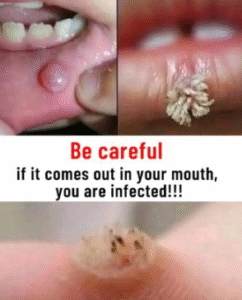Be Very Careful: If It Comes Out in Your Mouth, You May Be Infected
Our mouths often serve as the first line of defense—and sometimes the first warning—when something’s not right inside our bodies. While not every strange taste, sore, or swelling is cause for alarm, certain symptoms that “come out in your mouth” can be signs of a serious infection and shouldn’t be ignored. Being aware of these red flags could help you catch something early, protect others, and possibly save your life.
Oral Thrush: A Telltale White Coating
One of the more common indicators of infection in the mouth is oral thrush, caused by the fungus Candida albicans. It presents as white, creamy patches on the tongue, inner cheeks, and sometimes the roof of the mouth or throat. It can be painful or cause a cottony sensation, and if scraped, the patches may bleed. Thrush often occurs when the immune system is weakened, making it a common issue for infants, the elderly, people with diabetes, or those taking antibiotics or corticosteroids.
If this appears suddenly in your mouth, especially as an adult, it could be a sign of an underlying condition like HIV/AIDS, cancer, or diabetes—and you should seek medical evaluation immediately.
Pus or Foul-Smelling Discharge: Warning of a Deep Infection
If pus or foul-tasting fluid comes out in your mouth, especially from around a tooth or the gums, it’s likely a dental abscess. This is a serious bacterial infection that can spread quickly. Along with pain, swelling, and fever, pus drainage from the mouth is a sign that the infection has advanced. Left untreated, it can spread to the jaw, neck, or even the brain.
Dental abscesses are medical emergencies. If pus is coming out in your mouth, do not delay seeing a dentist or going to the ER.
Metallic Taste or Bad Breath That Won’t Go Away
A persistent metallic taste, sometimes described as “rotten pennies,” or chronically bad breath that brushing doesn’t fix, can be signs of infection in the mouth, throat, sinuses, or even lungs. Infections such as tonsillitis, sinusitis, or respiratory tract infections can lead to postnasal drip and bacteria buildup, which then alter the chemistry in your mouth.
In some cases, these symptoms might even be linked to more severe issues such as liver or kidney failure. If you’re experiencing a strange taste with no clear cause, it’s time to consult your doctor.
Blood Without Injury
Blood in the saliva, especially when not connected to brushing or dental work, could point to gingivitis, periodontitis, or even oral cancer. Sudden bleeding without provocation requires immediate attention, particularly if accompanied by ulcers or lumps in the mouth.
Final Word
Our mouths can tell us a lot. If something unusual comes out—whether it’s white patches, pus, blood, or even a strange fluid—don’t ignore it. These signs often mean your body is trying to fight off a deeper infection. Acting quickly can prevent the spread of disease, reduce suffering, and potentially protect those around you.
When in doubt, always let a healthcare professional take a look. It’s better to be safe than sorry. Would you like a list of the top symptoms to watch for in a visual chart?
